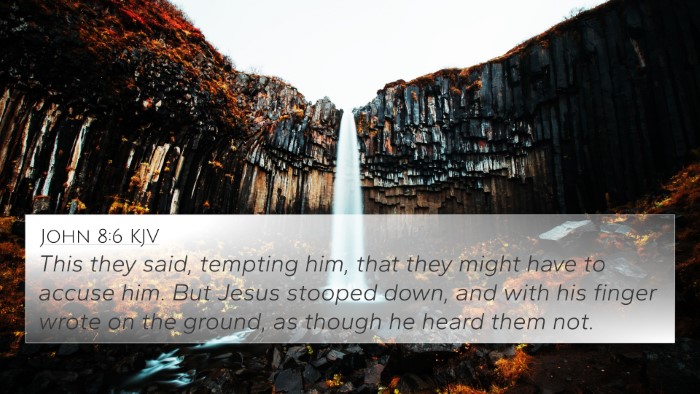Understanding Psalms 38:14
Psalms 38:14: "Thus, I became like a man who hears not, and in whose mouth are no arguments."
Contextual Overview
Psalms 38 is attributed to David, reflecting a deep sense of personal affliction and sorrow. Throughout the psalm, David expresses his physical and emotional suffering, pleading for God's mercy and intervention. In verse 14, he likens his silence in the face of enemies to that of a mute individual, which emphasizes his feeling of helplessness.
Commentary Insights
-
Matthew Henry: Comments that this verse may suggest a profound introspection where David feels surrounded by adversaries and chooses silence over defense, embodying the struggles of a faithful follower during trials. His silence reflects a heart burdened by grief, understanding that mere words cannot convey his turmoil.
-
Albert Barnes: Emphasizes that David's silence is a conscious decision, perhaps an act of humility or submission to God's will. Barnes suggests that this verse reinforces the theme of trust in God amid trials, as silence can represent reliance on divine intervention rather than human argumentation.
-
Adam Clarke: Provides a theological viewpoint, indicating that David's inability to speak in his defense signifies the overwhelming nature of his grief. Clarke points out that such experiences can lead believers to an understanding of spiritual desolation, where hope must be restored by divine grace.
Thematic Bible Verse Connections
This verse can be cross-referenced with other scriptural passages that explore themes of suffering, silence, and reliance on God:
- Job 13:19: Job’s silence amid accusation—reflects a similar theme of enduring pain without reply.
- Isaiah 53:7: Foretelling the Messiah’s suffering and silence before his accusers, connecting to the idea of silent suffering.
- Romans 8:26: Affirming that the Spirit helps in our weakness, which resonates with the silence experienced in deep sorrow.
- Matthew 27:12-14: Jesus’s silence before his accusers reflects the nobility of enduring suffering without defense.
- 1 Peter 2:23: Illustrates how Jesus did not retaliate but entrusted himself to God, connecting to the theme of silent submission.
- Psalm 39:9: Echoing similar sentiments of silence due to the weight of suffering, showing biblical parallels in emotional distress.
- Proverbs 17:28: Suggesting a wise man’s silence in the face of folly, indicating the power of restraint.
Cross-Referencing Methods
Understanding the connections between Bible verses, such as Psalms 38:14, can be enhanced through various methods:
- Bible Concordance: Utilize a concordance to find phrases or themes within Scripture.
- Bible Cross-Reference Guide: Refer to established guides that display related verses based on themes or phrases.
- Cross-Reference Bible Study: Engage in structured studies that highlight thematic links across the Bible.
Conclusion
Psalms 38:14 poignantly expresses a profound state of anguish, illustrated through the metaphor of silence. The insights from respected biblical commentators show that this silence is not simply a lack of words but a deep spiritual state of trust in God's providence. The verse serves as a reminder of the faithful endurance in trials and the importance of seeking divine strength in moments where human arguments fall short.
Related Bible Verse Cross-References:
- Job 13:19 - Connection via silent endurance amid accusations.
- Isaiah 53:7 - Silence as a prophetic emblem of suffering.
- Romans 8:26 - The Spirit’s role in our moments of weakness.
- Matthew 27:12-14 - Jesus's silence before the governor.
- 1 Peter 2:23 - Christ's example in suffering without retaliation.
- Psalm 39:9 - The theme of silence in distress.
- Proverbs 17:28 - Wisdom in silence amidst folly.
Through diligent cross-referencing, one can enrich their understanding of how Psalms 38:14 fits into the broader narrative of scripture and reflects the timeless themes of suffering, trust, and divine intervention.






